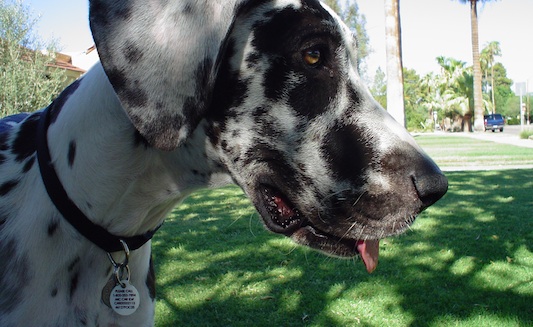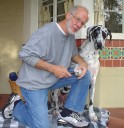
Our family dog, Cedie, died today. For some people, a dog is just a dog. For others, a dog is part of the family. For those who have shared a life with a Great Dane, it is no understatement to say, given their incredible size and demeanor, they are very much human.
But as with all dogs, they are locked into a stage that is, perhaps, akin to a two or three year old, never fully independent, seeing the world through the eyes of a child, forever eager to please. Perhaps that is why we have for thousands of years incorporated canines into our human lives, long ago enticing them to join the hunt and the campfire.
More than any animal on the planet, we have bred dogs to meet so many of our needs—to work along side us in police cars and fire engines, to guide those bound to wheelchairs, to locate lost children and discover hidden dangers. Every day is new for a dog, every day appreciated as though it were the first and the last.
In Cedie’s case, her life was many times extended for she was born without the enzymes required to digest her food. Each and every bowl served this past eight and a half years required the addition of enzymes in order that she could benefit from the sustenance she consumed.
We arrived to the veterinarian, just two blocks from my parent’s house, at 7 AM. The neighbor Darren, my father, mother, brother and I carried her, each holding a fold of the blanket on which she lay. One hundred and forty pounds moved with relative ease from SUV to the floor of the clinic.
The vet needed only a few minutes to recognize the extent of the situation, to let us know that surgery would not likely lead to a positive outcome. Cedie’s twisted stomach had likely also damaged her spleen. It was best to put her down.
It’s that moment, that brief instant in which you realize this companion will no longer be present in your life. It is then that you realize the routine of your day will no longer be built around the needs of this creature for which you have been caring for nearly a decade. It is the loss of the routine, the being needed as much as receiving which will be missed.
I stood in the doorway to the lab where Cedie lay on the floor. My mother was stroking her neck and belly, my father her front left leg. My brother was holding one of her front paws, dew claw to toe nail equal in size to that of his own hand.
The vet had introduced a needle and tube through which a pink fluid (a strange colour for something that brings an end to life). Cedie’s breathing slowed, her eyes no longer made contact with each of us. Her tongue no longer worked to moisten her mouth nor deliver cooling to her insides. Eventually, she … just … stopped.
At some undetermined point in time Cedie’s blood no longer circulated, her bone marrow no longer produced new blood cells, and her nervous system stopped transmitting signals that enabled awareness of temperature, movement of air, aromas and smells which for a dog create a complex map of the world.
At some point, the living, breathing, digesting, interacting body remains a wonderfully complex but no longer animated assembly of organs, cells, and molecules. For eight years, the atoms in Cedie’s body were held captive in the form of a canine. Today, they were released again, free to become something altogether different.
At what moment does one no longer harbour self-awareness? At what point does consciousness cease? We may never know. But when Cedie’s body is returned to the soil, new life will rise from her ashes, the same molecules again given form and function in the cycle of life on this planet Earth.
We thank the momentary form that was Cedie, for the laughter, the frustration, the routine, and the exchange of warmth. Mammal to mammal, pack animal to pack animal, we thank her for leading us around the block countless thousands of times. Through walking Cedie, my father became an integral member, even a leader of this local, historic community. Because of her many children overcame their fear of dogs.
Because of you Cedie, we experienced what it means to give and give and give without expectation of anything in return. That, more than any of the animal features we do share, eyes, nose, ears, and tongue made you a part of our human family.
Next time around, we’ll enjoy you in the flowers and herbs which rise in the spring, their aroma relinquished to the desert air. Again, you will arouse our noses, but this time (we do request) in a more pleasing manner. You’ll still be here, with us, in a wholly new form, recycled over and over, again and again.
